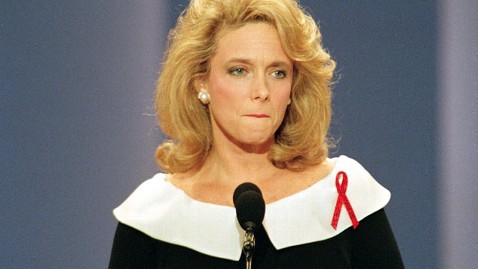Mary Fisher, Who Helped Change AIDS Stereotype, Is Still Fighting

Image credit: Ron Edmonds/AP Photo
Stunned silence may be the best way to describe the crowd at the 1992 Republican National Convention as they watched Mary Fisher, the HIV-positive daughter of a prominent businessman, encourage the party to tackle the AIDS crisis and overcome the stigma associated with the disease.
Standing before the convention, the 34-year-old mother of two shattered the stereotypes of AIDS as the "gay man's disease," driving home the severity of the epidemic to middle America.
Yet, nearly two decades later, Fisher and other AIDS activists say access to affordable treatment is today's major challenge for the 1.2 million Americans living with HIV. It's this access that may be at stake in tomorrow's Supreme Court decision.
If the court decides that the Affordable Care Act is unconstitutional in its entirety, then the provision protecting people with pre-existing conditions - which include those who are HIV positive - will fall.
Fisher says that provision will make it easier for HIV patients to access affordable medication.
"My speech in so many respects could be given again today," Fisher said. "If we can get people to get tested, know their status, and if they're positive, we do have medications to get their viral load down. Treatment becomes prevention. They just have to have access to it."
WATCH: Peter Jennings Reports in 1996 That HIV May No Longer Be A Death Sentence
The Department of Health and Human Services estimates that only about 17 percent of those living with HIV have private health insurance, and about 24 percent have no form of health insurance at all. For those who are covered by the state, Medicaid and Medicare are the largest source of insurance for those living with HIV and AIDS. The health care bill removes certain eligibility requirements for low-income adults, expanding the range of coverage under Medicaid, which would benefit people who are HIV positive.
"We are at a unique moment in time domestically," said Dawn Averitt Bridge, founder of The Well Project, a not for profit corporation focused on HIV/AIDS women's issues.
Bridge, who was diagnosed with HIV in 1988, serves on President Obama's advisory council for HIV and AIDS. She says that even with private insurance, proper treatment is expensive, and her condition makes her vulnerable to price increases and limits access to proper care.
"I'm acutely aware of how difficult it is to access affordable care," Bridge said, "and I have a good job, I make a good income. I'm the best-case scenario."
Many HIV positive Americans and activists today are kicking off National HIV Awareness Month by encouraging people to get tested.
Fisher is also dealing with a recent breast cancer diagnosis and treatment, and her experience with that disease has pointed to the contrast surrounding the two diseases regarding access to treatment and facilitating awareness.
"The difference between being diagnosed with cancer and being diagnosed with AIDS is night and day," Fisher said. "With a cancer diagnosis, you get sympathy, you get help. When you get diagnosed with AIDS, you get judgment, you judge yourself."
Bridge said that although significant progress has been made in the past 20 years, we still have a lot of work to do.
"There are 50,000 new HIV infections every year," Bridge said. "For an entirely preventable disease, that's unacceptable."
WATCH: Peter Jennings Reports in 1996 About HIV Awareness
Fisher will not be speaking at this year's GOP convention despite her personal connection with candidate Mitt Romney. The two went to prep school together in Michigan, although she denies reports they dated seriously.
"We were always with a group of people, with friends," Fisher said. "I may have gone to a dance with him, but nothing serious."
Get more pure politics at ABC News.com/Politics and a lighter take on the news at OTUSNews.com